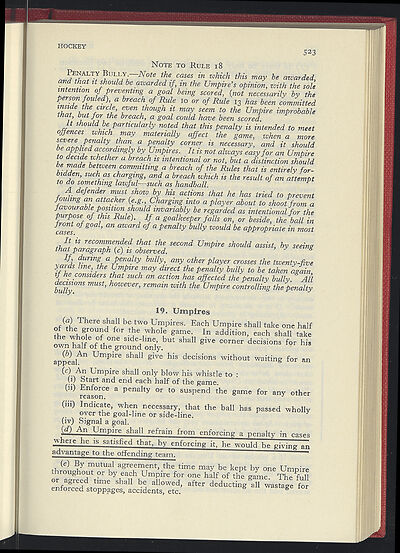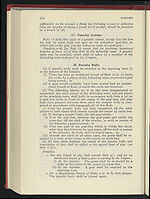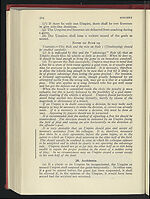1959-60
(593)
Download files
Complete book:
Individual page:
Thumbnail gallery: Grid view | List view

523
HOCKEY
NOTE To RULE 18
PENALTY
BULLY.—Note
the cases in which this may be awarded,
and that it should be awarded if, in the Umpire's opinion, with the sole
intention of preventing a goal being scored, (not necessarily by the
person fouled), a breach of Rule
to
or of Rule
13
has been committed
inside the circle, even though it may seem to the Umpire improbable
that, but for the breach, a goal could have been scored.
It should be particularly noted that this penalty is intended to meet
offences which may materially affect the game, wh
en
a
more
severe penalty th
an
a
p
ena
l
ty
corner is necessary, and it should
be applied accordingly by Umpires. It is not always easy for an Umpire
to decide whether a breach is intentional or not, but a distinction should
be made between committing a breach of the Rules that is entirely for-
bidden, such as charging, and a breach which is the result of an attempt
to do something lawful—such as handball.
A defender must show by his actions that he has tried to prevent
fouling an attacker (e.g., Charging into a player about to shoot from a
favourable position should invariably be regarded as intentional for the
purpose of this Rule). If a goalkeeper falls on, or beside, the ball in
front of goal, an award of a penalty bully would be appropriate in most
cases.
It is recommended that the second Umpire should assist, by seeing
that paragraph (c) is observed.
If, during a penalty bully, any other player crosses the twenty-five
yards line, the Umpire may direct the penalty bully to be taken again,
if he considers that such an action has affected the penalty bully. All
decisions must, however, remain with the Umpire controlling the penalty
bully.
19. Umpires
(a) There shall be two Umpires. Each Umpire shall take one half
of the ground for the whole game. In addition, each shall take
the whole of one side-line, but shall give corner decisions for his
own half of the ground only.
(b) An Umpire shall give his decisions without waiting for an
appeal.
(c) An Umpire shall only blow his whistle to
(i) Start and end each half of the game.
(ii) Enforce a penalty or to suspend the game for any other
reason.
Indicate
,
when necessary, that the ball has passed wholly
over the goal-line o
r
s
id
e
-li
ne.
(iv) Signal a goal.
(d) An Umpire shall refrain from enforcing a penalty in cases
where he is satisfied that, by enforcing it, he would be giving an
advantage to the offending team.
(e) By mutual agreement, the time may be kept by one Umpire
throughout or by each Umpire for one half of the game. The full
or agreed time shall be allowed, after deducting all wastage for
enforced stoppages, accidents, etc.
'J
HOCKEY
NOTE To RULE 18
PENALTY
BULLY.—Note
the cases in which this may be awarded,
and that it should be awarded if, in the Umpire's opinion, with the sole
intention of preventing a goal being scored, (not necessarily by the
person fouled), a breach of Rule
to
or of Rule
13
has been committed
inside the circle, even though it may seem to the Umpire improbable
that, but for the breach, a goal could have been scored.
It should be particularly noted that this penalty is intended to meet
offences which may materially affect the game, wh
en
a
more
severe penalty th
an
a
p
ena
l
ty
corner is necessary, and it should
be applied accordingly by Umpires. It is not always easy for an Umpire
to decide whether a breach is intentional or not, but a distinction should
be made between committing a breach of the Rules that is entirely for-
bidden, such as charging, and a breach which is the result of an attempt
to do something lawful—such as handball.
A defender must show by his actions that he has tried to prevent
fouling an attacker (e.g., Charging into a player about to shoot from a
favourable position should invariably be regarded as intentional for the
purpose of this Rule). If a goalkeeper falls on, or beside, the ball in
front of goal, an award of a penalty bully would be appropriate in most
cases.
It is recommended that the second Umpire should assist, by seeing
that paragraph (c) is observed.
If, during a penalty bully, any other player crosses the twenty-five
yards line, the Umpire may direct the penalty bully to be taken again,
if he considers that such an action has affected the penalty bully. All
decisions must, however, remain with the Umpire controlling the penalty
bully.
19. Umpires
(a) There shall be two Umpires. Each Umpire shall take one half
of the ground for the whole game. In addition, each shall take
the whole of one side-line, but shall give corner decisions for his
own half of the ground only.
(b) An Umpire shall give his decisions without waiting for an
appeal.
(c) An Umpire shall only blow his whistle to
(i) Start and end each half of the game.
(ii) Enforce a penalty or to suspend the game for any other
reason.
Indicate
,
when necessary, that the ball has passed wholly
over the goal-line o
r
s
id
e
-li
ne.
(iv) Signal a goal.
(d) An Umpire shall refrain from enforcing a penalty in cases
where he is satisfied that, by enforcing it, he would be giving an
advantage to the offending team.
(e) By mutual agreement, the time may be kept by one Umpire
throughout or by each Umpire for one half of the game. The full
or agreed time shall be allowed, after deducting all wastage for
enforced stoppages, accidents, etc.
'J
Set display mode to:
![]() Universal Viewer |
Universal Viewer | ![]() Mirador |
Large image | Transcription
Mirador |
Large image | Transcription
| Games and sports in the army > 1959-60 > (593) |
|---|
| Permanent URL | https://digital.nls.uk/248870747 |
|---|
| Description | 'Games and Sports in the Army' was an annual publication produced by the British War Office between the 1930s and 1960s. This included the Second World War. It outlines the rules and regulations for games and sports played by members of the armed forces. It features names and photographs of team members, and examples of contemporary advertising. |
|---|---|
| Shelfmark | GWB.52 |

